Key takeaways:
- Ethical dilemmas often arise in professional settings, forcing individuals to choose between personal values and job responsibilities.
- Pro-life advocacy demands a balance between honesty and empathy, particularly when presenting sensitive information.
- Open dialogue and seeking mentorship are crucial strategies for resolving ethical challenges and aligning actions with core values.
- Lessons learned include the importance of patience, empathy, and vulnerability in fostering understanding and collaboration during ethical conflicts.
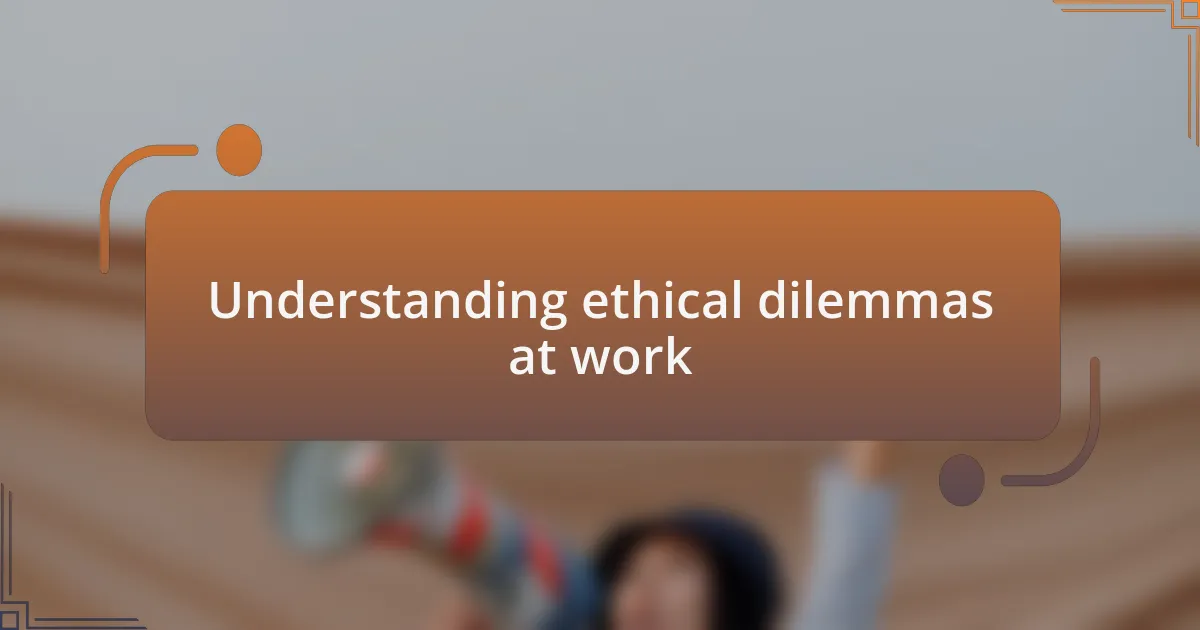
Understanding ethical dilemmas at work
Ethical dilemmas at work often emerge when professional responsibilities clash with personal values. I remember a time when I was faced with a decision that left me questioning my principles. I was asked to promote a project I fundamentally disagreed with, and I found myself wondering: should I prioritize my job security or stand by my beliefs?
In another instance, I encountered a colleague who was under immense pressure to cut corners on a project. It made me reflect on the fine line we often walk in the professional world. When does a “shortcut” become an ethical breach, and how do we find the courage to voice our concerns without risking our position?
Navigating these situations can feel incredibly isolating, but I’ve learned that discussing them with trusted peers can provide clarity. I often ask myself how those around me might handle similar predicaments. Engaging in these conversations not only helps me process my choices but also reinforces the importance of maintaining integrity in our professions.
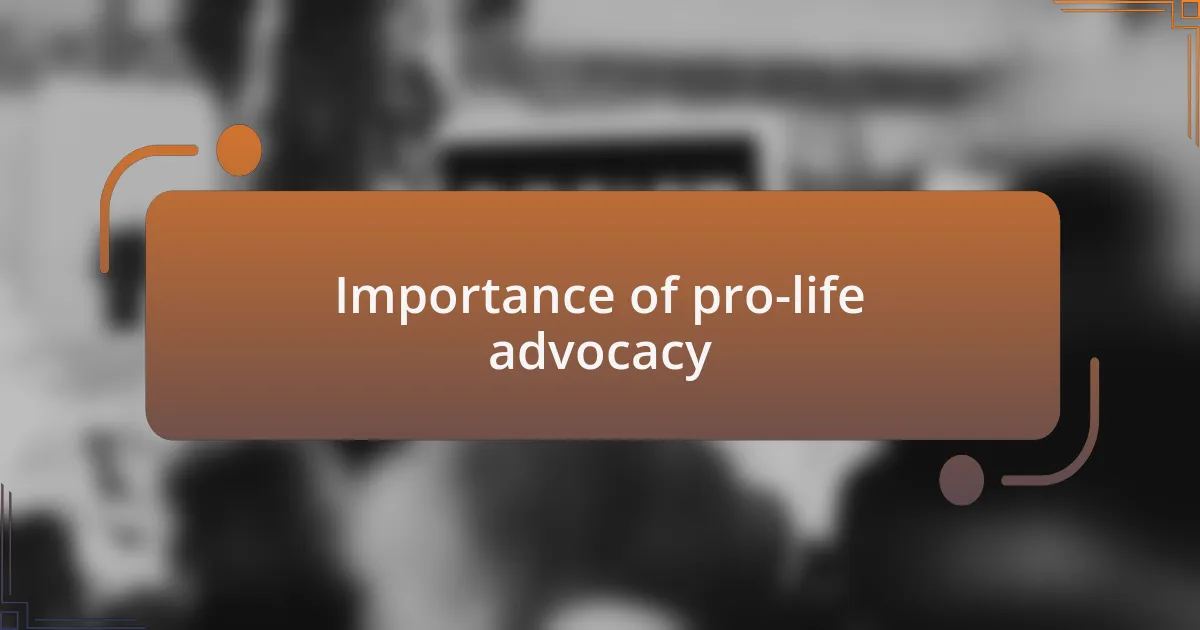
Importance of pro-life advocacy
Pro-life advocacy plays a crucial role in shaping societal attitudes towards the sanctity of life. I often think about how our collective voice can challenge norms and influence legislation, making a real difference for mothers and children. When I attended a pro-life rally, I witnessed firsthand the passion of individuals who believe in the value of each life, which made me realize how powerful unity can be in promoting compassion and support for vulnerable populations.
Understanding the importance of pro-life advocacy often comes from personal experiences that shape our perspectives. There was a moment in my life when I met a woman who had chosen life against overwhelming odds, and her story resonated deeply with me. It became evident that every life has a story worth telling and a value that extends beyond mere existence, reinforcing why we must continue to advocate for those who cannot advocate for themselves.
Additionally, pro-life advocacy fosters a culture of awareness and education about the emotional and physical consequences of abortion. I recall a time when a friend shared her struggles with the aftermath of an abortion, highlighting the need for empathy and support rather than judgment. These conversations underline the imperative to create safe spaces for dialogue, where individuals can explore their choices while being surrounded by compassion and understanding.
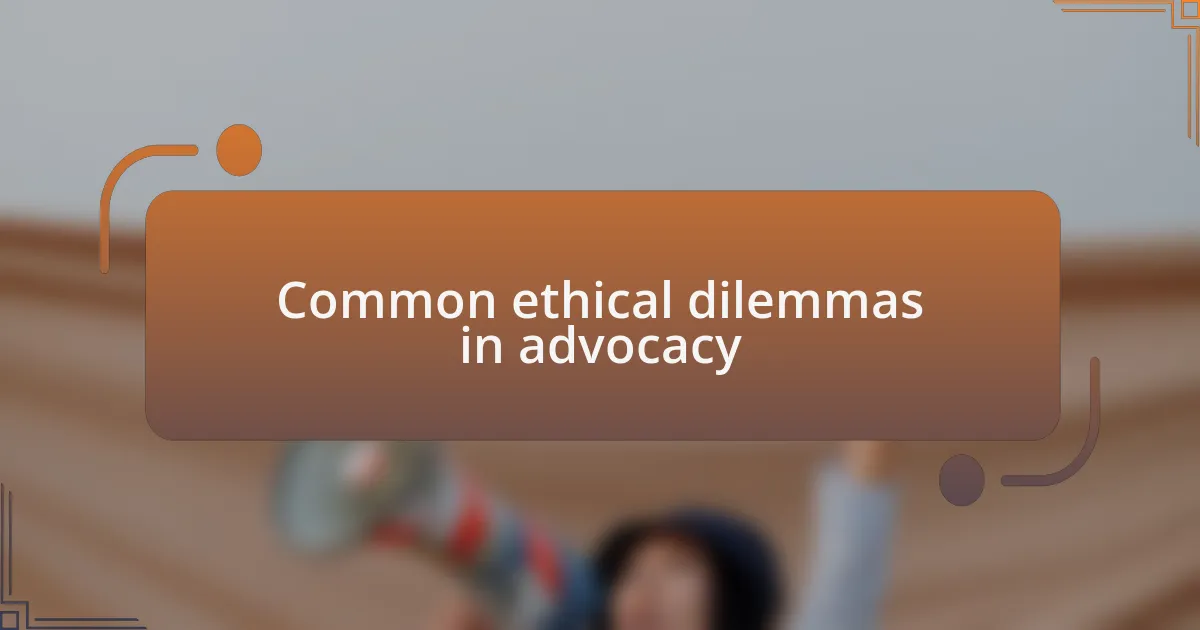
Common ethical dilemmas in advocacy
Advocacy work often presents ethical dilemmas that can leave one feeling torn. For instance, when I was involved in organizing an event, I faced a choice: how to present sensitive information without alienating potential supporters. It made me ponder—how do we balance the need for honesty with the desire to invite more people into the conversation? This challenge of crafting messages that respect differing viewpoints is a constant in advocacy.
Another ethical dilemma I encountered was when a colleague suggested using emotionally charged imagery to draw attention to the cause. While I understood the intention—to evoke a strong response—I couldn’t shake the discomfort it caused me. Would such an approach genuinely connect with people’s hearts, or merely shock them into inaction? It’s a delicate line we walk, determining how best to motivate others while maintaining integrity.
Additionally, I recall a situation where I had to decide whether to share a personal story that illustrated the complexity of pro-life decisions. On one hand, sharing it could foster understanding, yet I worried about oversimplifying a deeply personal and painful experience. This led me to ask myself: in our advocacy, are we prioritizing genuine connection, or are we trying to fit complex narratives into digestible soundbites? Balancing authenticity with the need to persuade is a constant ethical dance in this field.
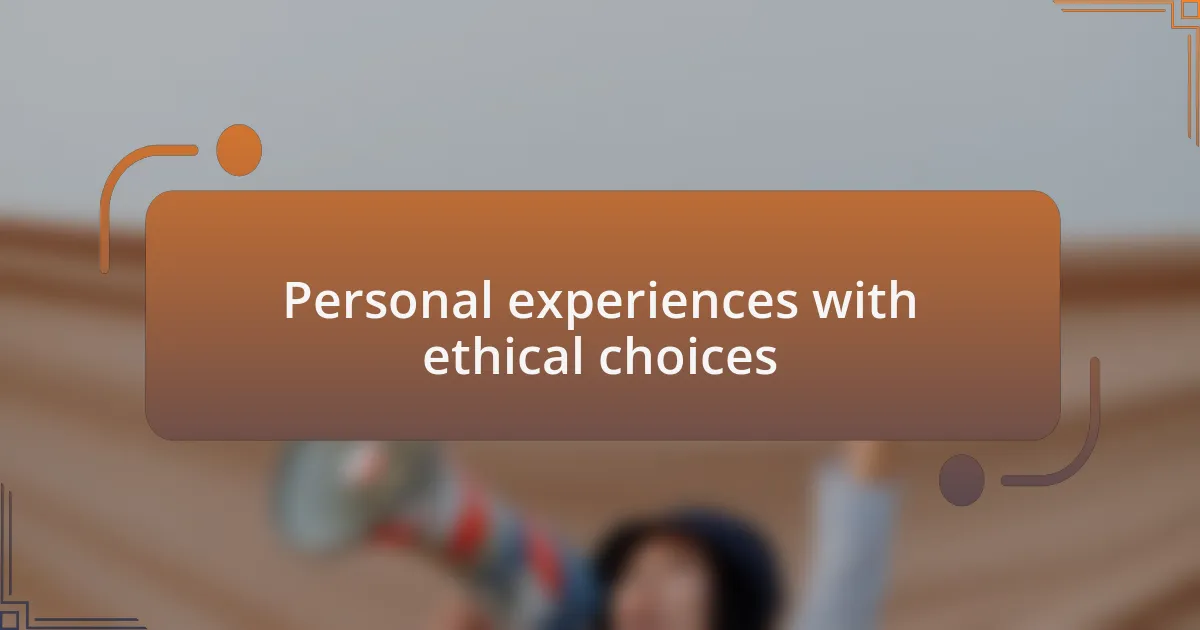
Personal experiences with ethical choices
One of my most challenging experiences was deciding whether to confront a peer who spread a misleading statistic about pro-life issues. I remember feeling torn between the duty to uphold factual integrity and the fear of creating conflict within the group. It made me question, how much responsibility do we bear for the accuracy of information shared, especially when it comes from someone we respect?
On another occasion, I found myself grappling with the ethical implications of a fundraising campaign aimed at supporting pregnant women in crisis. I vividly recall discussions about whether to highlight the hardships these women face, risking their privacy and dignity in the process. My heart ached as I thought, are we truly helping, or are we merely using their stories to further our cause? Ultimately, I chose a path that honored their experiences while still advocating for support, which felt more aligned with my values.
There was a time when I was asked to participate in a panel discussion about the emotional repercussions of abortion. As I prepared to share my thoughts, I wrestled with the fear of opening old wounds. I couldn’t help but wonder, what message would my vulnerability send? Would it foster understanding, or would it lead to further division? Reflecting on this experience taught me that ethical choices often come down to balancing personal truth with the greater goal of empathy.
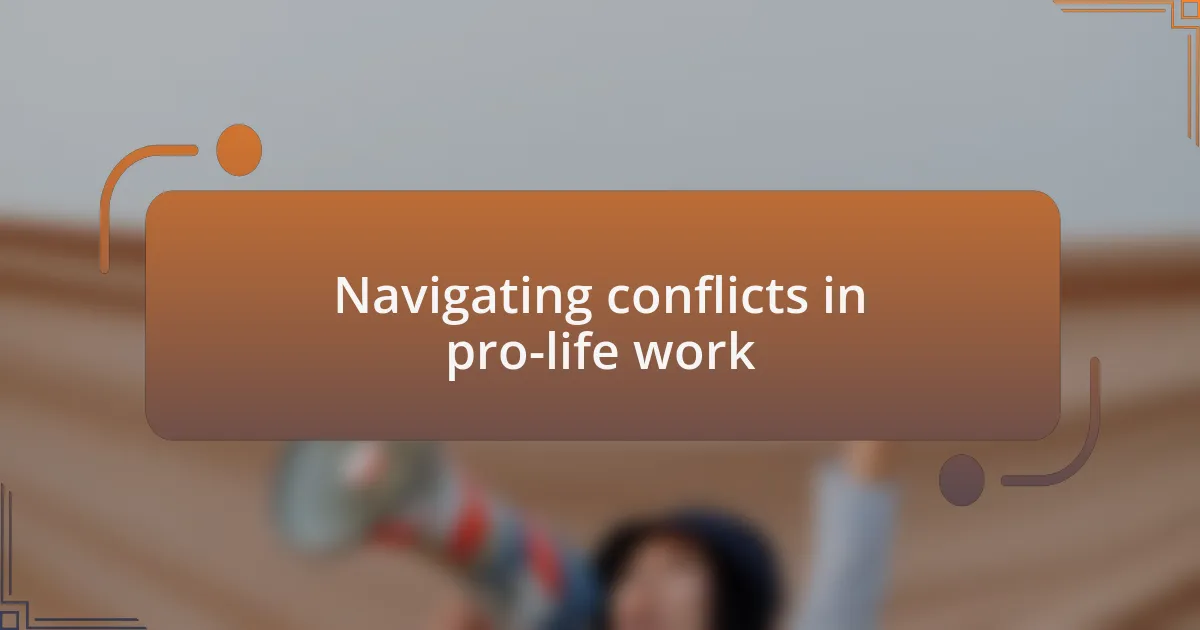
Navigating conflicts in pro-life work
Navigating conflicts in pro-life work often requires a delicate balance between personal beliefs and the collective mission. I once found myself on a team where colleagues had differing views on how to address abortion in our outreach materials. It was a tense situation; I wondered, should we prioritize raw honesty about abortion’s implications, or craft a message that might resonate more broadly with those who are undecided? This conflict pushed me to engage in deep conversations, ultimately leading us to craft a message that was both truthful and empathetic.
Another incident that stands out involved a disagreement over partnering with a local organization that had a mixed reputation. The team was split; some believed the partnership would enhance our reach, while others felt it compromised our values. I vividly recall feeling torn, sensing the weight of our decision. Was the potential benefit worth the ethical cost? This tension forced me to evaluate the essence of our work and how collaborations can either uplift or undermine our foundational beliefs.
Sometimes, I also encountered conflicts when speaking to pro-choice advocates. I vividly remember a debate where I felt the urge to respond defensively to challenge, but I soon realized that aggression wouldn’t lead to understanding. I thought, how can we foster positive dialogue, even when we disagree? This experience taught me that patience and active listening can turn conflicts into opportunities for connection and growth, ultimately benefiting our cause.
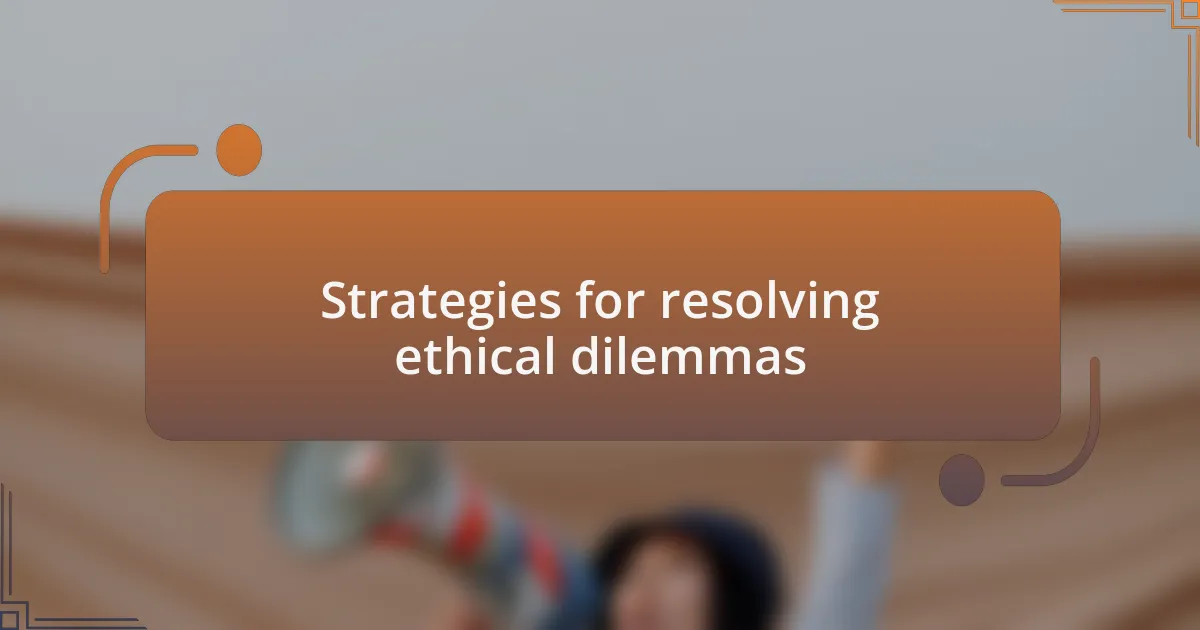
Strategies for resolving ethical dilemmas
Addressing ethical dilemmas requires a structured approach, and I’ve found that creating an open forum for discussion can work wonders. In one instance, our team faced a significant decision about whether to participate in a public protest. Instead of just debating among ourselves, we invited external voices—community members and pro-life advocates—to share their perspectives. This inclusivity not only broadened our understanding but also helped us reach a more balanced conclusion together.
Another effective strategy is taking the time to reflect individually on the core values that guide our decisions. I remember grappling with whether to support a particular campaign that seemed to conflict with my understanding of ethical advocacy. Stepping back and writing down my thoughts helped clarify my position. I asked myself, “What truly aligns with my mission?” This introspective process not only eased my anxiety about the decision but also illuminated the reasons behind my choices, aligning our actions with our principles.
Lastly, I’ve learned the importance of seeking mentorship during tough ethical decisions. In one challenging moment, I hesitated over a communications plan that seemed more confrontational than I felt comfortable with. A seasoned colleague kindly offered to discuss my concerns, leading to a deeper exploration of how our messaging could be more constructive. This interaction not only resolved my dilemma but also reinforced the value of collaborative support in navigating complex ethical landscapes.
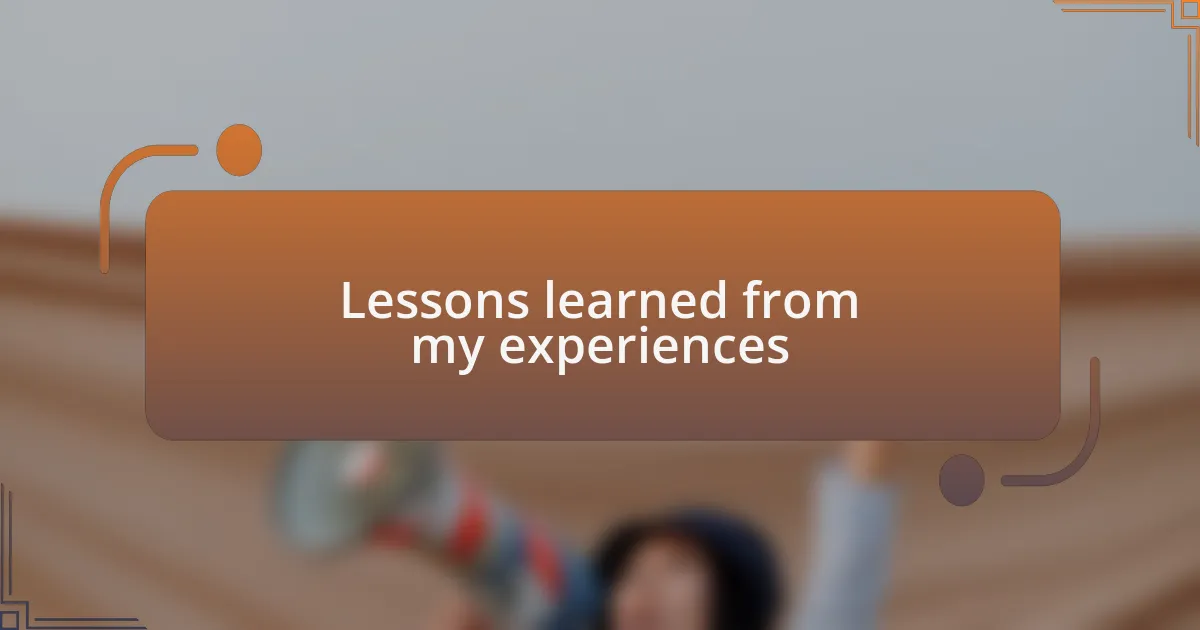
Lessons learned from my experiences
Navigating ethical dilemmas has taught me the profound impact of patience and understanding. I recall a moment when a colleague and I disagreed on a proposed initiative. Instead of letting our differing views escalate frustration, we took a step back to discuss our motivations and fears. That exchange not only revealed underlying values but also deepened our trust and collaboration. It made me realize that listening is just as important as speaking when facing tough choices.
Another lesson came during a particularly heated discussion about messaging strategy. I vividly remember feeling torn between wanting to be assertive and my desire to remain respectful. In that moment of uncertainty, I learned to appreciate the power of empathy. Questioning my approach further—“How would I want to be treated if our roles were reversed?”—transformed my focus from persuasion to connection. This shift allowed me to advocate more effectively while maintaining respect for differing opinions.
Lastly, I’ve discovered that vulnerability can be a strength. In one situation, I openly shared my fears about a decision that might not resonate with everyone. Admitting my uncertainties sparked a fruitful dialogue, surprising me with the support I received. It was a reminder that being honest about our struggles can foster solidarity and open the door to innovative solutions. How could embracing vulnerability shift our approach to ethical dilemmas? I believe it can unlock understanding and inspire others to share their truths as well.